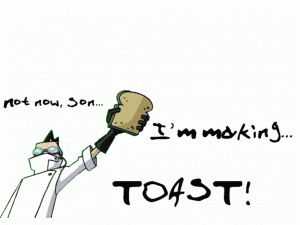For me, reading Virtual Organisms in high school nailed it (although it may always have been something of a fait accompli).

It’s certainly an interesting question, though, both for those of us who are still gainfully employed in science, and for those of us who now use our science superpowers for other purposes.
Dr Colin Hanbury, who is with the Graduate School of Education at the University of Western Australia, is trying to figure out why increasing numbers of Aussie high school kids aren’t choosing to study science.
In order to help him do so, he’s designed a questionnaire, open to people from any country, asking them, well, why they did choose to study science.
I’ve been in touch with Colin, and he said he’s particularly interested in comparing New Zealand and Australia. Also, he’ll give me a shout when the results are ready, so stay tuned :)
In the meantime: go forth! Fill out forms*! Let’s get some pretty data to play with.
Also, if anyone happens to have to hand information on student enrollments in NZ, by subject, I’d be most keen to have a look…
—————
* It’s a quick and painless procedure